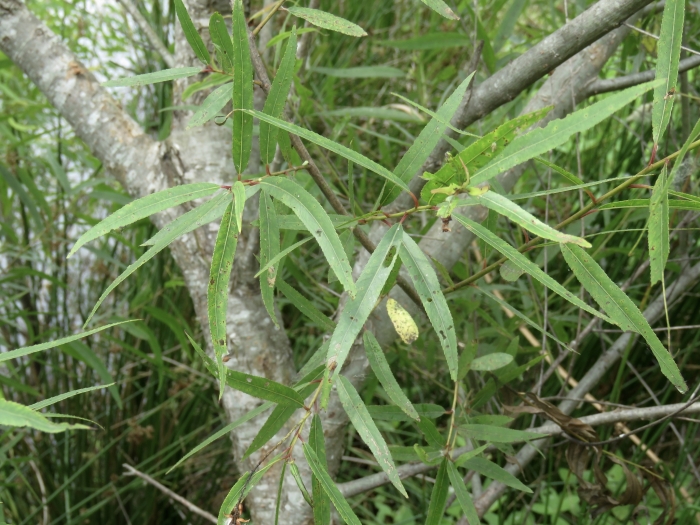Black Willow
(Salix nigra)
Black Willow (Salix nigra)
/
/

Laura Clark
CC BY 4.0
Image By:
Laura Clark
Recorded By:
Copyright:
CC BY 4.0
Copyright Notice:
Photo by: Laura Clark | License Type: CC BY 4.0 | License URL: http://creativecommons.org/licenses/by/4.0/ | Rights Holder: Laura Clark | Publisher: iNaturalist | Date Created: 2016-05-21T12:39:15-07:00 |




























































Estimated Native Range
Summary
Salix nigra, commonly known as Black Willow, is a medium-sized deciduous tree native to floodplains, wetlands, and riparian zones in the Eastern and Central USA, extending into Southern Canada. It is the largest North American willow species, reaching heights of 10–30 m (35–100 ft) with a trunk diameter of 50–80 centimeters (20–30 in). The bark is dark brown to blackish, developing deep fissures as the tree matures, and the tree often exhibits forking near the base. Black Willow is dioecious, with male and female flowers appearing as small, greenish-yellow to yellow catkins 2.5–7.5 centimeters (1–3 in) long in early spring, coinciding with the emergence of new leaves. The foliage turns lemon yellow in autumn.
In cultivation, Black Willow is valued for its rapid growth and adaptability to wet conditions, making it an excellent choice for erosion control and riparian restoration projects. It thrives in full sun to part shade and prefers moist to wet soil with good drainage. While it is resistant to herbivory and flooding, it can be susceptible to pests like the willow beetle and diseases such as willow scab and black canker. Gardeners should be aware of its potential invasiveness outside its native range and its aggressive root system, which may interfere with underground utilities.CC BY-SA 4.0
In cultivation, Black Willow is valued for its rapid growth and adaptability to wet conditions, making it an excellent choice for erosion control and riparian restoration projects. It thrives in full sun to part shade and prefers moist to wet soil with good drainage. While it is resistant to herbivory and flooding, it can be susceptible to pests like the willow beetle and diseases such as willow scab and black canker. Gardeners should be aware of its potential invasiveness outside its native range and its aggressive root system, which may interfere with underground utilities.CC BY-SA 4.0
Plant Description
- Plant Type: Tree
- Height: 30-60 feet
- Width: 30-40 feet
- Growth Rate: Rapid
- Flower Color: N/A
- Flowering Season: Spring
- Leaf Retention: Deciduous
Growth Requirements
- Sun: Full Sun, Part Shade
- Water: High
- Drainage: Fast, Medium, Slow
Common Uses
Bee Garden, Bird Garden, Butterfly Garden, Deer Resistant, Erosion Control, Fire Resistant, Fragrant, Salt Tolerant, Water Garden
Natural Habitat
Floodplains, wetlands, and riparian zones in the Eastern and Central USA, and Southern Canada
Other Names
Common Names: Swamp Willow , Saule Noir , Svartpil
Scientific Names: Salix nigra , Salix tristis , Salix nigra var. lindheimeri , Salix vulgaris , Salix nigra var. altissima , Salix nigra var. nigra , Salix nigra var. falcata , Salix ambigua , Salix falcata , Salix gongylocarpa
GBIF Accepted Name: Salix nigra Marshall